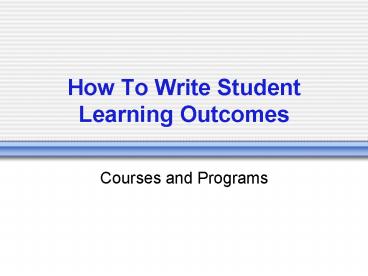How To Write Student Learning Outcomes - PowerPoint PPT Presentation
1 / 21
Title:
How To Write Student Learning Outcomes
Description:
Includes three domains. Cognitive (knowledge) Psychomotor (physical skills) ... Several levels in each domain, from simple to complex. Verbs to AVOID for SLOs ... – PowerPoint PPT presentation
Number of Views:335
Avg rating:3.0/5.0
Title: How To Write Student Learning Outcomes
1
How To Write Student Learning Outcomes
- Courses and Programs
2
Student Learning Outcomes
- What should students be able to DEMONSTRATE by
the end of the course? - Big-picture, overarching, general
- Few in number (3-5 SLOs, 8 max)
- Must be observable
3
SLOs vs. Course Objectives
- Theyre not the same!
- Objectives are smaller and simpler tasks
- SLOs require integration and synthesis
- SLOs represent higher-level skills
4
SLOs
- Must be made public
- Syllabi
- Department websites
- Department brochures
- Someday class schedule and/or catalog
5
SLOs
- The same for all sections of a course
- Written in language that students and others will
understand - Ask students to apply what they have learned
6
SLOs
- Must be assessable/observable!
7
SLOs
- Use action verbs from Blooms Taxonomy
- Blooms Taxonomy verbs can be found at
http//www.laney.peralta.edu/SLOs in the
Documents section - For college-level classes, SLOs must use
higher-level verbs (analyze, synthesize,
evaluate)
8
Blooms Taxonomy
- Includes three domains
- Cognitive (knowledge)
- Psychomotor (physical skills)
- Affective (attitudes, behavior, values)
- Several levels in each domain, from simple to
complex
9
Verbs to AVOID for SLOs
- Do not use
- Know
- Understand
- Learn
- Demonstrate knowledge
- These are not observable!
10
Good SLO verbs to use
- Analyze
- Synthesize
- Evaluate
- Solve
- Design
- Create
- Perform
- Critique
- Justify
- Construct
- Produce
- Teach
- Defend
- Customize
- Compose
- Etc.
11
SLO Examples
- Labor Studies 12 - Collective Bargaining
- Apply collective bargaining theories from both
management and labor perspectives. - Analyze and apply the principles of collective
bargaining and labor law during negotiations. - Utilize negotiation skills in labor and employer
relations.
12
SLO Examples
- Media 131
- Organize and produce an editing project from
conception to final output to videotape, disk, or
the Web. - Math 203 - Intermediate Algebra
- Solve algebraic equations and inequalities.
13
SLO Examples
- Chemistry 1A/1B
- Analyze the results of laboratory experiments,
evaluate sources of error, synthesize this
information, and express it clearly in written
laboratory reports. - Design, construct, and interpret graphs
accurately.
14
SLO Examples
- ESL Grammar 1 and 2
- Demonstrate correct basic grammar usage in
controlled situations, in both oral and written
communication. - Recognize and correct basic grammar errors in
simple sentences.
15
SLO Examples
- Machine Technology 1
- Demonstrate basic shop safety and safe attitudes
in all class activities. - Analyze engineering drawings and blueprints to
determine part features size, location,
tolerance, and relationships.
16
Program Outcomes
- For degrees/certificates
- For a sequence of courses in a department
- Just like course outcomes, but relate to the
program as a whole - What the student should be able to do by the end
of a program
17
Program Outcomes
- Are usually assessed near the end of the program
- Must be mapped to specific courses in the
program
18
Curriculum Map
19
Simple Curriculum Map
20
Assessing SLOs
- All SLOs must be assessed 3-year cycle
- Assessment involves collecting information on how
many students successfully met the standard for
each SLO - Must define standards for successful performance
21
Whats Next?
- Learn how to create assessment tools (rubrics,
scoring guides) - Assess your outcomes
- Discuss your results
- Plan changes/improvements
- Report your results































